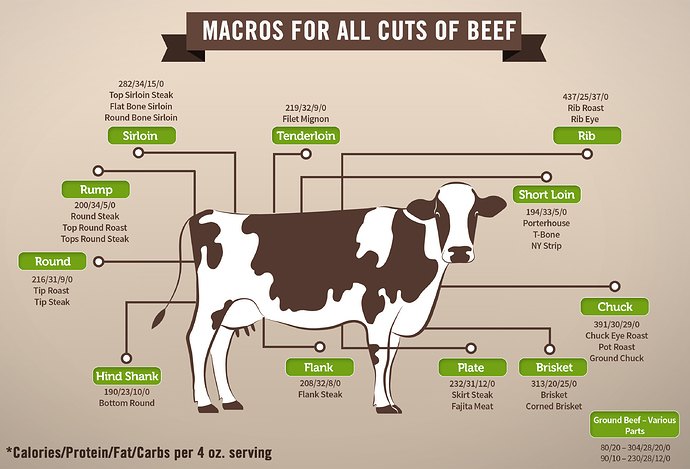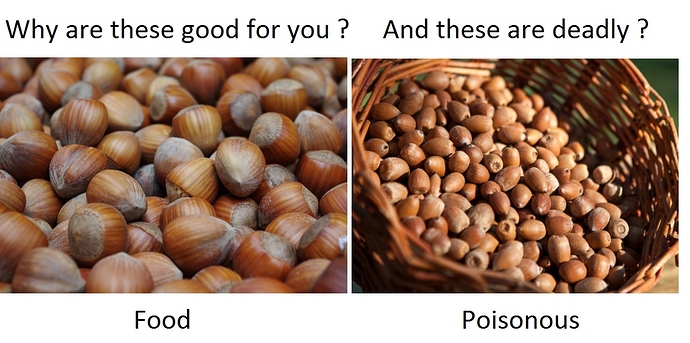I’ve taken Natural Calm for quite a while and it’s generally good at helping me sleep, so there’s something else going on. I’ve got a theory it might be that I’ve been eating to much protein. For several weeks I’very been eating higher protein. Also I’ve been eating my last meal later in the day. I’m going back to moderate protein and making sure not to eat after 3 pm. When I was doing that I slept like a baby.
I'm out
Eggs are fine as a side sometimes, but I don’t eat them all the time. Eggs from happy chickens are best.
Wow. Why is this hard ? (Note: I can calculate manually).
I’d like a chart or some source of meats and their macro %s (which usually is % calories).
Any source ?
EDIT:
F,P,C %
Beef, ground, 90% lean meat / 10% fat, crumbles, cooked, pan-browned [hamburger, ground sirloin]
http://nutritiondata.self.com/facts/beef-products/6196/2
47/53/0%
Beef, ground, 85% lean meat / 15% fat, crumbles, cooked, pan-browned [hamburger, ground round]
http://nutritiondata.self.com/facts/beef-products/6201/2
54/46/0%
Beef, ground, 80% lean meat / 20% fat, crumbles, cooked, pan-browned [hamburger, ground chuck]
http://nutritiondata.self.com/facts/beef-products/6206/2
58/42/0%
Beef, ground, 70% lean meat / 30% fat, crumbles, cooked, pan-browned
http://nutritiondata.self.com/facts/beef-products/8000/2
60/40/0%
Ground beef by the numbers (with hand calculated Macros by me)
Per 100 grams (3.5 ounces), broiled
Extra-lean ground beef
Calories: 203
Protein: 30 g (60%)
Fat: 9 g (40%)
Lean ground beef
Calories: 250
Protein: 26 g (45%)
Fat: 15 g (55%)
Medium ground beef
Calories: 270
Protein: 26 g (40%)
Fat: 18 g (60%)
Regular ground beef
Calories: 304
Protein: 25 g (35%)
Fat: 22 g (65%)
McDonalds weights:
1 McDonalds hamburger (meat only) is 33g.
1 beef patty at McDonald’s has a weight of 1.8 ounces
These weights are approximate:
the uncooked weight of our hamburger patties is at least 44g.
After cooking, they weigh 30g.
Quarter Pounder patties are at least 113g uncooked and 78g cooked.
Angus Third Pounder patties are at least 151g uncooked and 111g cooked.
So, let’s say beef has around a Macro of Fat/Protein/Carb of 50/50/0.
Do people need to add fat to that to get the fat/protein ratio more keto-friendly ?
You don’t ever have to add fat to make something keto-friendly, you only have to remove carbs and protein. You can get into ketosis on a zero-fat diet as long as your carbs are really low and you don’t eat too much protein. In fact I know there are some weight loss clinics that use such a 80-90% protein, low calorie ketogenic diet for rapid fat loss with maximum lean body mass retention.
Adding fat would make something more ketogenic only in the sense that it can be a helpful tool in replacing protein (and carbs), but it’s not at all necessary for ketosis. In fact, as I think you know, fasting is the ultimate ketogenic diet, and it has zero fat.
Let’s review some Evolution. Mankind was clearly evolving towards Obligate Carnivory as a a species right up until the Younger Dryas. As a hunter-gatherer there was almost always some intake of plant based foods, but it was usually seasonal, especially in temperate zones such as Europe, etc. Mankind is fairly adapted to eat most dicots, with a few exceptions. It’s the monocots, legumes, curciferous, nightshades, etc where the arguments of limited adaptations can be made, manifested on a limited basis according to individual genetics. ZC was clearly a major part of nutrition, as pemmican was the common method for storing meat and fat. This does not mean Mankind lost it’s adaptation to eat plant based foods. So, this “plant scare” is waaay overblown, unless you have a specific detrimental reaction due to your individual genetics. Sweeping generalizations border on nuttiness.
I eat ZC quite often, I’m very comfortable with it, but I always insure 60% of calories comes from fat. I also insure I’m getting vitamins and minerals, either from organs or supplements. I suspect it’s these two issues cause people problems with ZC, with not enough fat, not enough micro nutrients, or a combination of both. Higher protein can certainly cause problems. Whenever I do desire to eat veggies, or for that matter fruits, I eat them. There’s nothing wrong with it, they are not typically discordant, (unless identified as so on an individual basis) and are natural within Mankind’s evolutionary development.
The real issue is lipolytic nutrition being Mankind’s natural state, instead of merely ketogenic.
I like it.
I’ll say that fasting is mankind’s natural state as breakfast was invented by capitalists.
Cavemen fasted over 12 hours a day guaranteed.
It depends.
Not if they had plenty of pemmican, made from running that herd of Mammoths off the cliff last Fall…
I’m still bothered that this is about protein in a vacuum. Especially in a ZC thread. Eat more fat, the ratio should never make it to 50/50 fat / protein, this is playing with fire. Even bear ate 80 / 20. Granted, perhaps the cuts we get today are less fatty, unless you’re eating ribeye all day or something else well marbled. Fat would need to be supplemented. Not hard. Heavy cream is great, butter if you like it, bacon fat, tallow.
Depending of the policies of your local grocery store, like mine, they’ll sell fat trim by the pound. I just roast extra along with the meat. Usually around 12 minutes for the fat. Mmmm, lightly seasoned it’s very tasty.
I made this for you.
I was researching can I eat an acorn ? Note: you can’t
The Health Canada website says acorns are bad.
http://www.cbif.gc.ca/eng/species-bank/canadian-poisonous-plants-information-system/all-plants-common-name/canadian-poisonous-plants-information-system-red-oak-common-name/?id=1370403267189
Toxic plant chemicals in acorns:
gallic acid
pyrogallol
tannic acid
Poisoning can lead to depression, anorexia, loss of condition, and kidney damage. Kidney failure usually results in death (Duncan 1961, Cockerill and Beasley 1979).
Tannins in acorns cause medical problems including colic, bloody diarrhea and intestinal upset.
Left: Hazelnuts
Right: Acorns
“Look pretty similar to me”.
Enjoy @Amber !
Note: I live dangerously and eat them at Christmas. YMMV.
The reference you provided is about toxicity in cattle and horses, which is more or less “common knowledge” and should also include dogs. The authors are all veterinarians. Other animals, famously squirrels, have no issues eating acorns it seems so I did some googling:
Acorns have been a common food, sometimes a staple, in several human societies throughout the ages as evidenced by historical references going back at least to the romans as well as surviving traditions. Eaten raw in large quantities they can be poisonous to humans as well but in smaller quantities or properly prepared (blanched) they are harmless. Tannins are pretty common in plant biology and can also be found in relatively high quantities in hazelnuts and in many other plant foods, for example tea.
As I recall, within the concept of paleo nutrition, acorns were typically boiled, dried, and pounded into flour before being used as a staple. I wonder if it was added to pemmican?
Some of the most expensive ham, available in Spain, is made from hogs fed on acorns.
Wow! I have never even thought to ask about that at my grocery! My son trims fat off his meat before cooking and saves it for me - which I love! I will inquire within very soon… thanks!
You can also render the fat for tallow, which you then cook with, as you would with butter, lard, or bacon grease. It makes things taste great!
Nobody’s claiming we completely lost the ability to eat plants. Our guts shrunk tremendously, but we still have some.
I don’t think it’s fair to call the carnivorous diet a plant scare. The fact is, some people, many people at this point, have reported feeling better when they don’t eat plants. In some cases, dramatically so. It is therefore important that people realise that plants aren’t the panacea we are told they are, and they shouldn’t worry about not eating them.
@amber Just last night I listened to your interview with Daisy on the Keto Woman podcast. It has me very intrigued. I want to know more about ZC/carnivore eating. I have some very dear friends who are high into eating lots of vegetables and legumes (vegetarian/vegan), and they absolutely insist, like really really emphatically, that I have to have “the alkalinity of the veggies to off put the acidity of all the animal products you (I) am consuming.”
How do I rebut this? Right now I am not saying anything, because 1) I’m not ZC yet, only keto and still getting the ‘eat lots of veggies’ mandate, and 2) I have no idea how to answer it anyway.
I’m one to show people the science, but sometimes people can look at it and read it and still refuse to accept it. Not that we ketonians don’t know about that…! I have a feeling they would take my offered science explanation and still give me the stink eye or take it with at huge grain of salt (read: ignore it).


